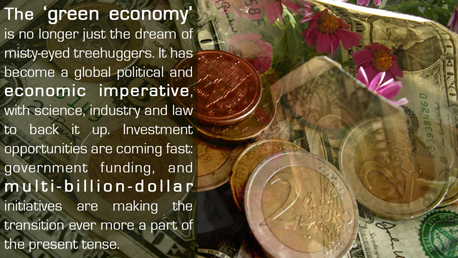
Between the years 2008 and 2020, we are likely to see a still unimaginably sweeping shift away from fossil fuels and high-contamination modes of powering our economy. The transition will have a political component, but will be driven mostly by cost concerns, resource scarcity, and public demand for cleaner air and responsible climate policy, a demand which is not ideological in nature.
The long-term overhaul of the global economy, to bring it in line with what would be a responsible climate policy, will be more gradual, and has for some time now been taking its first halting steps toward acquiring momentum. But wealthy countries, ostensibly the most dependent on carbon-based fuels, also enjoy the conditions that permit broader flexibility in fuel resourcing, namely an economic cushion and variety in the marketplace.
It is often necessary to assess economic trends in emotional terms, or to use a new catch-phrase in social awareness and economic undercurrent analysis, to locate the 'tipping point', after which momentum becomes reality. This idea is attractive to those who want the market to 'set' the rules, i.e., design-in public consciousness and cost-considerations based on 'what the market will bear'.
This last idea is often used to justify the notion that a commonly talked-about direction is the inevitable direction: not for reasons of a grand conspiracy nor because one company will profit from its point of view taking hold, but because if the known ideas dovetail with real economic momentum, then investors find some measure of stability. Instead of blaming the 'perfect storm' of unforeseen events for a given failure, they believe they'll be able to cite something like a 'perfect groupthink', with a delightfully positive outcome.
The problem is: groupthink as is well known is not a grand scheme brought into being by the best and brightest minds to achieve the most good for the largest number of people or interests; it is a way in which deferring to incomplete ideas bandied about in an echo-chamber leads to poor decision-making, hands bound, intellectual traps and the failure of policy to meet the moment.
So, the market may signal a point of 'readiness' in consumer consciousness, or the tipping point in support among those who will have to actually 'transition' their systems into the new cleaner model, but it will not give us sound policy suggestions. It will be emotional, slow to react, and not thoughtful enough. We must still look to the human element, to scientific analysis, and to the imagination of those tuned to the problem.
On 30 November, the AP and the Washington Post reported that officials from 150 global corporations, worth more than $4 trillion in market capital, have signed a petition urging strong action to mandate emissions cuts and reduce global carbon emissions by at least 50% by 2050. The move reflects a growing unease about inaction by policy-makers, that unease rooted in the feeling that irresponsible delays will cost far more later, possibly sinking large companies when mandatory cuts are, potentially and by need, more radical and harder to adjust to.
Concerns about the rapidly rising cost of fuel for heating indoor spaces or providing electricity, are driving a race to implement environmentally-friendly building techniques: structures that leak less heat, or that are easier to power, or include power-generating elements like solar paneling, which can now be integrated into roofing or cladding.
Cost is a major concern, but the goal is elasticity, protecting the bottom-line while allowing a company to weather price pressures from volatility in fossil fuel markets. The result is what looks like a move toward ecological responsibility in building practices, a first step toward re-structuring an economy that feeds on environmental degradation, in hopes it can be made sustainable.













No comments:
Post a Comment